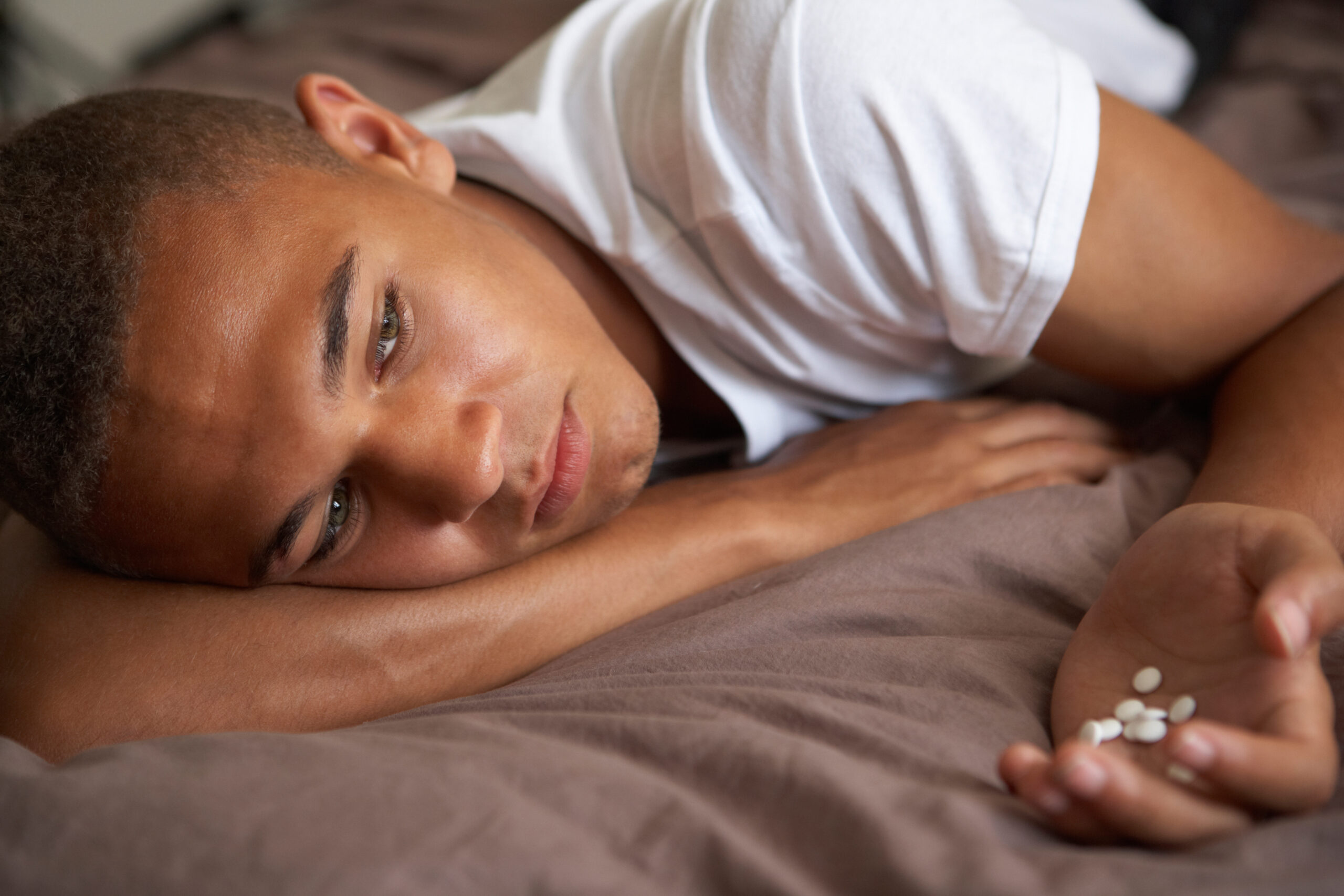
Drug and alcohol addictions are warning signs and challenges that affect people of all ages. Studies suggest that the younger one is when they start drinking or using, the more likely they are to develop an addiction to substances later in life. Once addictions develop and the medical and mental health implications of substance use start to affect your teen’s physical and emotional well-being, it can be difficult to overcome addiction without support from a teen-focused treatment program like ours at Beachside.
Teen Addiction Statistics
As parents, it is natural to be concerned about the risks your child faces as they grow and develop into young adults. One such risk that many teens face, especially in high school, is the growing presence of substance abuse. Recent studies show that the availability of drugs on school campuses is high and many youths either have tried or know someone who uses drugs. Other notable statistics related to drug and alcohol use among teens include:
- Almost 20% of teens have been sold, offered, or given drugs while on school property.
- Up to 5% of teens surveyed for a recent study stated they had used drugs in the month before the survey took place.
- 58.% of 12th graders have tried alcohol.
- 16% of 12th graders reported using marijuana in the past 30 days.
- Approximately 11% of high school students report misusing amphetamines, and 7% report misusing the specific drug Adderall.
- About 7% report abusing prescription pain medications.
Studies suggest up to 25% of high school students report using or experimenting with some type of drug or alcohol. In addition to those referenced above, examples of other substances commonly misused or abused by teens include inhalants, LSD, hallucinogens, MDMA, cocaine, and cough medications.
Six Warning Signs of Addiction in Teens
It can be challenging for parents and guardians to establish if their teens are using drugs or alcohol. This is because many of the indications that suggest someone might be using drugs or alcohol are also behaviors that are common in teens. It is also possible that potential signs of drug and alcohol use may be symptoms of a new, undiagnosed mental health concern such as anxiety or depression. Suppose you are concerned about behavioral changes in your teen. In that case, it is ok to reach out to their primary care provider or a mental health treatment professional at Beachside to learn more about your teen’s symptoms.
Behavioral changes and changes to social activities
It is not out of the ordinary for teen behavior to change- often frequently-as, they grow and develop into young adults. Emotional, mental, and physical changes are part of puberty, and all teens experience these changes at some level. But, they can be warning signs. A common change that occurs for many teens is withdrawal and changes in their social activities. Some teens may become more isolated. You may also notice a shift in who your teen spends time with. While these changes are not abnormal, it is crucial to avoid writing them off as an expected part of teen development. These can be potential warning signs.
Suppose your teen suddenly insists on absolute privacy in their room or avoids answering questions about their plans, activities, and interactions with friends. In that case, it may indicate their behavioral changes are an early indication of substance use or abuse. Other behavioral changes such as missing curfew, sneaking out of the house, and skipping school may indicate it is time to seek help at a treatment program like Beachside.
Although parents may hesitate to confront their teens about substance use because they do not want to worsen the situation or because they fear the outcome of asking about drug and alcohol use, these are vital conversations to have. Allowing your concerns to go unaddressed could mean your teen continues to use drugs or alcohol without getting the help they need to overcome addiction.
Changes to their peer groups
Outside of family members, your teen’s social and peer groups are among the most significant influences on their behavior. Parents are often familiar with some or all of the key members of their child’s social groups. If you notice a change in your teen’s usual peer group, it is important to take notice as a warning sign. Although drastic interventions such as limiting who they socialize with or forbidding contact with certain peers may not be beneficial, remaining active and engaged in monitoring your teen’s social groups can go a long way in spotting warning signs before trouble begins.
Alterations in your teen’s personality
Moodiness and “teen angst” are indeed a part of typical teen behaviors. How teens express their emotions will change as they grow. Those who once talked so much it was impossible to get a word in may suddenly seem quiet and distant. Tempers, slamming doors, frustration and anger often accompany the hormonal changes that occur during puberty. Teens also experience emotional changes that are part of growing and developing independence. Teens often feel it is time for parents and caregivers to let go and give them the freedom they want and need to develop into young adults. Some teens may push harder than others.
Although puberty and hormonal change are the cause of many teen behavioral changes, other illicit substances can cause the same challenges. Drugs frequently used by teens, such as heroin, methamphetamine, marijuana, alcohol, and cocaine, can also dramatically impact mood and behavior. If you are concerned about your teen’s behavior, it may be a good idea to sit down and have a heart-to-heart talk about your worries. Although they may not want to at the time, be sure they know you are available and open to talk whenever they feel comfortable.
Changing academic performance
There are several reasons why a teen’s academic performance may change. Various mental health conditions, peer stress, anxiety, challenges at home or with social groups, and worries about college and their future can all lead to declining grades and difficulties at school. Another primary cause of declining academic standing is drug and alcohol use. While changing grades does not guarantee your teen is using drugs or alcohol, it may suggest there has been a change that could be a cause for concern. Whether related to substance abuse or mental health, early intervention is often critical in getting your teen on the road to healing and recovery.
Physical warning signs of addiction
Drug and alcohol use affect all body systems. Although some indications of substance use are easier to see or present more readily than others in time, many visible signs of substance use will appear. Physical signs of substance abuse will vary depending on the substance used; however, a few examples may include:
- Flushed skin
- Bloodshot eyes
- Poor personal care and hygiene
- Dilated pupils
- Sudden weight changes
- Changes in sleeping habits
- Fatigue or lethargy
- Frequent nosebleeds
- Unexplained bruising
- Shakes or tremors
- Pale skin
- Sweating
The presence of drug paraphernalia
Perhaps one of the most definitive signs your teen is using substances is the presence of drugs, alcohol, or drug paraphernalia in their room, backpack, or car. Items such as lighters, scales, bongs, needles, balloons, pipes, burned spools, vials, or bands for tourniquets are all indications of substance use. Empty pill bottles, cans, bottles, or bags with powder or dust are also suggestive of substance use.
What To Do If You Suspect Your Teen is Using
If you suspect your teen is using or experimenting with drugs, it is vital to get them addiction support help as soon as possible. Studies who that early intervention at a teen-focused addiction treatment program provides the greatest opportunities for recovery and long-term sobriety. In addition to asking them directly, there are a few other things you can do to determine if your teen is abusing drugs or alcohol.
Look at their eyes
The eyes can tell a lot about substance use. Many illicit substances, as well as alcohol, affect the appearance of the eyes. For example:
- Drinking alcohol can cause dilated pupils and difficulties focusing.
- Marijuana causes red and bloodshot eyes, constricted pupils, and a “hooded” appearance of the eyelids.
- Other illicit drugs such as heroin, cocaine, meth, and LSD will change the appearance of the pupils.
“Smell” your surroundings
If your teen is drinking alcohol or smoking (tobacco, marijuana, or other illicit drugs), you will likely smell these substances on their clothing, hair, breath, or in the air around them, such as their bedroom or car.
Look around your home and space
Look in places such as the bathroom medicine cabinets and trash cans for wrappers and containers. You may also benefit from looking in your teen’s room or bag for indications of substance use. Typical places individuals hide drugs or drug paraphernalia include bureau drawers, under the bed, in books, small boxes (trinket boxes), inside plants, or in other false containers such as a fake soda can or water bottle.
Teen Addiction Treatment at Beachside
The safest way for your teen to overcome a drug or alcohol addiction is with professional treatment. Substance use disorder treatment for teens may begin with detox if needed. There are certain substances, such as alcohol, opioids, and benzodiazepine drugs, that can produce powerful and sometimes dangerous withdrawal symptoms when one stops using. Programs like Beachside Teen Treatment Center, medical, and mental health providers can support your teen throughout the process, ensuring they can focus on healing rather than managing withdrawal symptoms.
Once detox is complete, the next step in addiction treatment is comprehensive therapy. The duration of treatment and therapy model or models used as part of your teen’s treatment will depend on several factors unique to their needs and goals. There are several effective and beneficial therapies for drug and alcohol addiction, but not all are an ideal fit for everyone. Our providers at Beachside will work with your teen and family to develop a plan of care designed around your teen’s specific needs as they start their sobriety journey. If you would like to learn more about teen addiction treatment and how we can help your teen put addiction challenges in the past, contact us today for more information about our programs.
https://www.jaacap.org/article/S0890-8567(19)30211-4/fulltext





